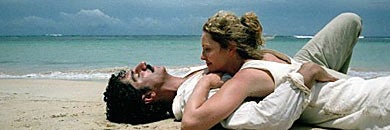Yes (15) **, Black Narcissus (PG) ****
Couple don't quite rhyme

He would be a Lebanese surgeon (Simon Abkarian) who's now working as a chef in London; she would be an Irish-American molecular biologist (Joan Allen) adrift in a loveless marriage to a cheating politician (Sam Neill). He first catches her eye as she sits miserably through a glitzy banquet, and without much ado they're getting hot and heavy under the duvet. Now this would be perfectly plausible as a scenario, even to the point of overlooking his gigolo moustache and its unfortunate evocation of Tom Conti in Shirley Valentine. But you may baulk at the fact that it's all couched in verse.
That's right, they're talking in iambic pentameters, rhyming couplets and all, which is either a challenging conceit or the most excruciating thing you've heard since, ooh, The Phantom of The Opera. Film-makers have got away with verse in contemporary contexts before; I loved the way Gus Van Sant mashed together bits of Shakespeare's Henry IV and V into the street talk of My Own Private Idaho.
There, the poetry found a visual complement in the trippy, dreamlike atmosphere Van Sant created around the Falstaff figure and his ragtag band of hustlers. In this instance, however, Potter is telling a realistic story, and while it works, to a degree, in the passionate arguments about race and faith, it sounds dreadfully stilted in the everyday passages of dialogue: "I was a doctor with a knife/ I cut the flesh to save a life".
It becomes a little wearisome, a conceit that tends to highlight itself rather than serve its undernourished story. The tricksiness of Potter's approach is further evidenced in the shift from one gimmick to another - slo-mo, multiple dissolves - and from one voice to another. The film is bookended by the direct-to-camera monologues of a cleaner (Shirley Henderson), hunkering over bedsheet and bath tub as she reflects, chorus-like, upon human detritus, germs and the cycle of life.
Late in the story, a comatose Irish woman (Sheila Hancock), slipping towards the grave, voices her last thoughts on socialism, mourning and the allure of Fidel Castro. At least credit Potter for her ambitious scope, and in her targeting of the mutual suspicion between Muslim and Westerner you can hardly deny the topicality, either. If only the film were something to enjoy. Potter's humanist, why-can't-we-all-get-along message is impeccable, but the effect is like being forced to listen to a double album of Sting: so tasteful you'd like to throttle it. What makes it bearable, and just occasionally moving, is the presence of Allen, wraithlike in the antiseptic whites and blues of the marital home, vivid and luminous in the company of her new-found love, and utterly disconsolate in the face of loss.
She also has the knack of speaking the verse in a way that sounds quite natural, a legacy no doubt of her considerable stage experience. In one anguished scene with Abkarian in an underground car park I forgot she was talking verse at all. She played this long-suffering wife in The Crucible, Pleasantville andThe Ice Storm, the kind of wife whom, as David Thomson has noted, the movies seem to know best - whether this reflects on Hollywood habits or on American marriage in general is a moot point. Either way, you will remember Allen's performance long after this hand-wringer of a film has slipped from memory.
Amid the rank weeds of the week's other releases Black Narcissus blooms alone. It was made almost 60 years ago, yet in the BFI's spanking new print, prepared for Michael Powell's centenary, it looks as fresh as paint. Based on the novel by Rumer Godden (who hated it, incidentally), the film addresses a subject that seems lurid even by today's standards - the fantasy life of nuns - yet makes of it something genuinely erotic and dark.
Deborah Kerr, as the proud, uptight Sister Superior, establishes an isolated convent high in the Himalayas only to find herself, and her sisters, prey to the place's unsettling influences: scouring winds, illness, local exotics and an impossible expanse of azure sky. Jean Simmons as a sultry dancing girl is distracting enough. But it's the rugged presence of an Englishman in shorts, the sardonic local agent, who finally tips the convent into a frenzy, personified in Kathleen Byron's astonishing performance as the paranoid psychotic Sister Ruth. (I defy you not to shiver with dread at her face in the closing minutes.)
Powell and Pressburger went to Pinewood, not India, to shoot, which may account for the torrid, glowering colours only a studio, and Jack Cardiff's superb Technicolor photography, could provide. It's a ripe piece of work, perhaps overripe, but as a study in sexual repression and hysteria there is nothing quite like it in British cinema.
Join our commenting forum
Join thought-provoking conversations, follow other Independent readers and see their replies
Comments
Bookmark popover
Removed from bookmarks